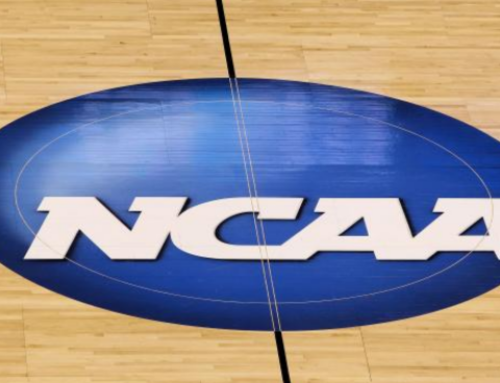So, You Want to Work in Sports? Consider These 5 Careers
There’s a time in every athlete’s life when they aspire to join the professional ranks. An admirable notion, yes. But once reality sets in, the sheer commitment and advanced skillset make the task more difficult to accomplish.
If you’re anything like me, a former athlete, then you might’ve chosen to play or even study sports in college. They have an entire major dedicated to it. Business schools offer Sport Management programs to help nurture future broadcasters, journalists, and marketing leads. This industry has some of the most diverse positions that aren’t limited to the constraints of athletic competition.
Inevitably, your athletic career will come to an end. So, in the meantime, check out these careers that will have you consider swapping your training spikes for a desk chair.
#1: Coach
Average Annual Salary: $36,330
An old maxim attributed to George Bernard Shaw’s ‘Man and Superman’ goes, “those that can, do” and “those that can’t, teach.” Whether his intentions were pure or not, this exemplifies a painful disconnect between coaching and performing skills. I’ll argue for this subtle fix, “those who CARE, teach.”
Even though you couldn’t make it as a professional athlete, you can do the next best thing: preparing the next generation of competitors. Coaching has several outlets leading you to careers like sports performance, nutrition, and personal training. Additionally, there are coaching opportunities within the sports themselves.
What to Expect: Coaching is a demanding, self-less job. The hours are long, and the pay can be inferior to comparable professions. You’d be hard-pressed to find coaches that consider these the top priorities. Coaches work to facilitate growth and are fully committed to the betterment of their clientele. If you wish to succeed, you’ll do well to remember this.
#2: Multimedia (Broadcasting/Journalism/PR)
Average Annual Salary: $50,000 – $80,000
Of the possible careers, multimedia has the most significant potential for growth. It’s no secret that we are in the golden age of technological creation. Sports are generating increased attention from a global audience that looks to the media for information. Due to the wide dissemination of media, you can create and share content at an electrifying clip.
Consider careers like broadcasting, journalism, and public relations. Many of these roles intersect with one another, making it a valuable space to build your career capital. That is, you’ll see different facets of multimedia that will help diversify your skillset and enhance your value.
Think about ways to differentiate yourself in the media space. Traditional news outlets are biased and borderline archaic. You have a platform to share the same information right at your fingertips. Explore some unconventional methods. Start a youtube channel, contribute to a blog or record your sports commentary. The options are unlimited.
What to Expect: You may choose a job in sports broadcasting where your responsibilities include in-game commentary and interviews. Perhaps you have a knack for journalism, and you’ll write, publish, and present compelling news stories. Public relations requires relationship-building; you’ll focus on developing positive connections between the media and the sports entity.
#3: Athletic Director
Average Annual Salary: $61,580
Athletic Directors’ (ADs) wear many hats. If you want a job with high day-to-day variability, this might be for you. You’ll be responsible for planning, organization, and operations management. Responsibilities will include budget preparation, allocation, equipment purchases, and facility upkeep.
Consider a career as an athletic director if you are an effective communicator and can thrive in crisis management situations. Working knowledge of sports is preferred, but not necessary.
What to Expect: ADs are responsible for overseeing the athletic departments at middle schools, high schools, colleges/universities, and other places with sports organizations. This role is outward-facing, meaning you are the spokesperson for the entire athletic program. Coaches, parents, and administrators will look to you for support and guidance.
#4: Data Analyst/Statistician
Average Annual Salary: $95,680
Along with multimedia, data and statistics are in a remarkable period of expansion. Thanks to the spread of analytical software, there is a high demand for these positions. Data is used across industries to help improve specific outcomes through predictive analytics.
Consider a career as a data analyst if you have an advanced background in mathematics, enjoy troubleshooting, and are ready to work extensively with predictive software.
What to Expect: Analytics have been employed across sports for some time. We’re only beginning to see the science emerging and its profound effects on game management. Analysts will be involved with player scouting, game outcome predictions, improvements in attendance, injury risk/mitigation, and performance metrics.
#5: Sports Agent
Average Annual Salary: $75,420
Cue the infamous line from Tom Cruise’s Jerry Maguire “Show me the MONEY!” Yes, he was a sports agent. A quality portrayal at that!
While not entirely necessary, a law degree is often the best path to a career as a sports agent. You are representing the interest of athletes, particularly in contract negotiations. To be effective, agents must have substantial knowledge of player value, which means knowing the sport and the team officials negotiating on the other side.
Consider this career if you have a passion for sports along with the requisite sales and business skills. You are going to be a powerful advocate for your client’s services. That is, you will be shopping them on the open market to secure the best financial returns for their athletic abilities.
What to Expect: You can expect a great deal of networking in this position. Not only will you have to sell your services to potential clients, but you’ll have to negotiate extensively on their behalf. Contracts, endorsements, and media packages are all included.
Final Word
Some folks use sports to catapult their careers despite a vested interest in the game. Others will tackle any role to maintain that connection. Don’t give up on a job in sports just because it didn’t work out with your athletic career. There are plenty of enticing roles that will fill that void. Coaching is the perfect outlet for those that are people-oriented. For the creatives, a job in multimedia will fulfill your artistic expression. A career in data and statistics will appease many data-driven minds. If you can imagine a career in sports, it’s probably out there. It’s time to go and find it.
RECOMMENDED FOR YOU
MOST POPULAR
So, You Want to Work in Sports? Consider These 5 Careers
There’s a time in every athlete’s life when they aspire to join the professional ranks. An admirable notion, yes. But once reality sets in, the sheer commitment and advanced skillset make the task more difficult to accomplish.
If you’re anything like me, a former athlete, then you might’ve chosen to play or even study sports in college. They have an entire major dedicated to it. Business schools offer Sport Management programs to help nurture future broadcasters, journalists, and marketing leads. This industry has some of the most diverse positions that aren’t limited to the constraints of athletic competition.
Inevitably, your athletic career will come to an end. So, in the meantime, check out these careers that will have you consider swapping your training spikes for a desk chair.
#1: Coach
Average Annual Salary: $36,330
An old maxim attributed to George Bernard Shaw’s ‘Man and Superman’ goes, “those that can, do” and “those that can’t, teach.” Whether his intentions were pure or not, this exemplifies a painful disconnect between coaching and performing skills. I’ll argue for this subtle fix, “those who CARE, teach.”
Even though you couldn’t make it as a professional athlete, you can do the next best thing: preparing the next generation of competitors. Coaching has several outlets leading you to careers like sports performance, nutrition, and personal training. Additionally, there are coaching opportunities within the sports themselves.
What to Expect: Coaching is a demanding, self-less job. The hours are long, and the pay can be inferior to comparable professions. You’d be hard-pressed to find coaches that consider these the top priorities. Coaches work to facilitate growth and are fully committed to the betterment of their clientele. If you wish to succeed, you’ll do well to remember this.
#2: Multimedia (Broadcasting/Journalism/PR)
Average Annual Salary: $50,000 – $80,000
Of the possible careers, multimedia has the most significant potential for growth. It’s no secret that we are in the golden age of technological creation. Sports are generating increased attention from a global audience that looks to the media for information. Due to the wide dissemination of media, you can create and share content at an electrifying clip.
Consider careers like broadcasting, journalism, and public relations. Many of these roles intersect with one another, making it a valuable space to build your career capital. That is, you’ll see different facets of multimedia that will help diversify your skillset and enhance your value.
Think about ways to differentiate yourself in the media space. Traditional news outlets are biased and borderline archaic. You have a platform to share the same information right at your fingertips. Explore some unconventional methods. Start a youtube channel, contribute to a blog or record your sports commentary. The options are unlimited.
What to Expect: You may choose a job in sports broadcasting where your responsibilities include in-game commentary and interviews. Perhaps you have a knack for journalism, and you’ll write, publish, and present compelling news stories. Public relations requires relationship-building; you’ll focus on developing positive connections between the media and the sports entity.
#3: Athletic Director
Average Annual Salary: $61,580
Athletic Directors’ (ADs) wear many hats. If you want a job with high day-to-day variability, this might be for you. You’ll be responsible for planning, organization, and operations management. Responsibilities will include budget preparation, allocation, equipment purchases, and facility upkeep.
Consider a career as an athletic director if you are an effective communicator and can thrive in crisis management situations. Working knowledge of sports is preferred, but not necessary.
What to Expect: ADs are responsible for overseeing the athletic departments at middle schools, high schools, colleges/universities, and other places with sports organizations. This role is outward-facing, meaning you are the spokesperson for the entire athletic program. Coaches, parents, and administrators will look to you for support and guidance.
#4: Data Analyst/Statistician
Average Annual Salary: $95,680
Along with multimedia, data and statistics are in a remarkable period of expansion. Thanks to the spread of analytical software, there is a high demand for these positions. Data is used across industries to help improve specific outcomes through predictive analytics.
Consider a career as a data analyst if you have an advanced background in mathematics, enjoy troubleshooting, and are ready to work extensively with predictive software.
What to Expect: Analytics have been employed across sports for some time. We’re only beginning to see the science emerging and its profound effects on game management. Analysts will be involved with player scouting, game outcome predictions, improvements in attendance, injury risk/mitigation, and performance metrics.
#5: Sports Agent
Average Annual Salary: $75,420
Cue the infamous line from Tom Cruise’s Jerry Maguire “Show me the MONEY!” Yes, he was a sports agent. A quality portrayal at that!
While not entirely necessary, a law degree is often the best path to a career as a sports agent. You are representing the interest of athletes, particularly in contract negotiations. To be effective, agents must have substantial knowledge of player value, which means knowing the sport and the team officials negotiating on the other side.
Consider this career if you have a passion for sports along with the requisite sales and business skills. You are going to be a powerful advocate for your client’s services. That is, you will be shopping them on the open market to secure the best financial returns for their athletic abilities.
What to Expect: You can expect a great deal of networking in this position. Not only will you have to sell your services to potential clients, but you’ll have to negotiate extensively on their behalf. Contracts, endorsements, and media packages are all included.
Final Word
Some folks use sports to catapult their careers despite a vested interest in the game. Others will tackle any role to maintain that connection. Don’t give up on a job in sports just because it didn’t work out with your athletic career. There are plenty of enticing roles that will fill that void. Coaching is the perfect outlet for those that are people-oriented. For the creatives, a job in multimedia will fulfill your artistic expression. A career in data and statistics will appease many data-driven minds. If you can imagine a career in sports, it’s probably out there. It’s time to go and find it.











